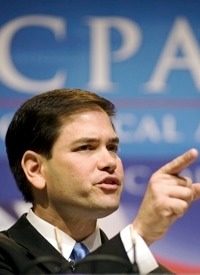
Florida’s U.S. Senate race indicates less competition between Democrats and Republicans and more rivalry between the two Republican contenders, Governor Charlie Crist and former State House Speaker Marco Rubio.
Both Crist and Rubio have a generous lead over presumptive Democratic nominee Representative Kendrick Meek. The latest telephone survey by the Rasmussen Report shows that Rubio leads Meek 48 percent to 34 percent. Similarly, Crist leads Meek 45 percent to 34 percent.
While Meek has remained in the low 30s within the past few months, this survey was conducted two days before Meek voted in favor of President Obama’s health care plan. Since 57 percent of Florida voters are opposed to the health care plan, Rasmussen’s numbers may not be entirely accurate.
Despite both Republicans’ large lead over the Democratic contender, the struggle between Crist and Rubio has been intense. Yesterday’s heated debate on Fox, moderated by Chris Wallace, is indicative of the contention between the two runners. Crist revealed a side of himself that Floridians have rarely encountered. Usually composed and calm, Crist surprised viewers with his aggressive nature at the debate. He attacked Rubio for his controversial spending on items from personal car repairs to plane trips during his time as House speaker.
To the dismay of conservative Floridians, Crist also embraced his moderate reputation. Rubio did not miss a beat when he jabbed, “In 2006, Governor, I voted for you. Because I trusted you when you said you were a Jeb Bush Republican.” On the contrary, Crist admitted to his support of the federal stimulus package and disclosed that he would have voted in its favor if he were Senator.
It is Crist’s moderate nature that has been the target of Rubio’s criticism. Rubio addressed this often during the debate and even said to Crist, “Everyone knows you won’t stand up to the Obama agenda.”
While Crist’s focus in the debate rarely strayed from Rubio’s spending, it did not distract viewers from Crist’s failure to answer key questions. Additionally, Wallace was forced to correct Crist when he attempted to claim that he has never raised taxes, though he raised both taxes and fees on everything from cigarettes to driver’s licenses less than one year ago.
Later, Crist’s credibility once again wavered when he addressed entitlement programs and remarked, “In order for these programs to survive so that my children and my grandchildren have an opportunity to be able to benefit from them, we have to spend less.” Crist has no children, or grandchildren for that matter.
The debate highlighted a major difference in the way Crist and Rubio view Social Security. Acknowledging that the Social Security program is now in the red, Rubio recommends that the retirement age be raised. “We are going to call upon people…that are far from the retirement age to make difficult but important and necessary choices to ensure that the runaway growth in entitlement programs and federal spending does not diminish our future or bankrupt America,” Rubio says. Crist, aware of Florida’s role as the country’s retirement capital, responded by saying that Rubio’s stance “flies in the face of many of my fellow Floridians.” Without recommending cuts, Crist asserts that the government needs to eliminate fraud and waste from the Social Security program.
Rubio currently has the edge on Crist, boasting an 11-point lead. The support of the tea party has been paramount in the current success of Rubio’s campaign. Rubio asserts that the United States is “being fundamentally redefined by this administration and this Congress” and has campaigned on the promise that he will stand up to the agenda of Obama and the Congressional Democrats.
It seems likely that the Republican nominee will be Florida’s next Senator. In 2008, Obama narrowly carried Florida 51 percent to 49 percent. As it stands, 55 percent of Florida voters disapprove of Obama’s performance, of which 46 percent strongly disapprove. Florida voters are looking for a change, but not the one Obama’s bringing.
Photo: Florida Republican Senate candidate, Marco Rubio addresses the Conservative Political Action Conference (CPAC) in Washington, Feb. 18, 2010.: AP Images




